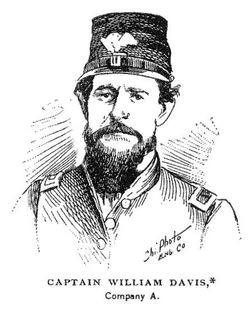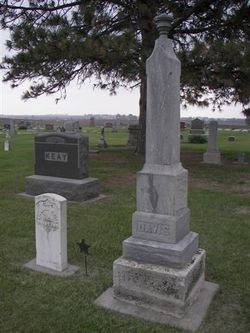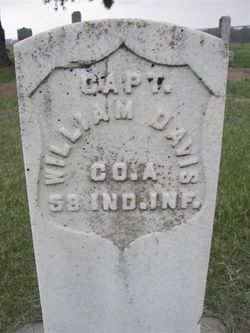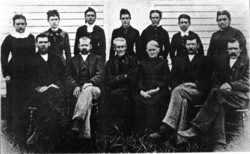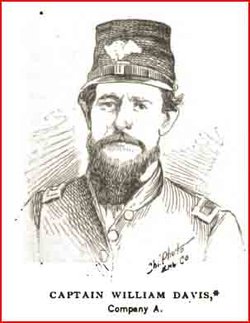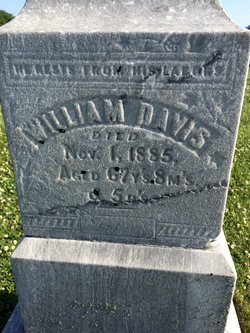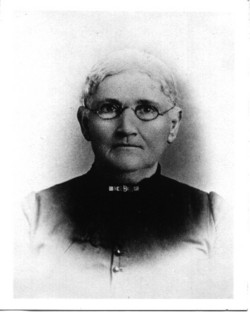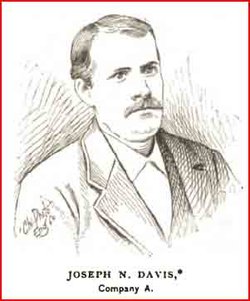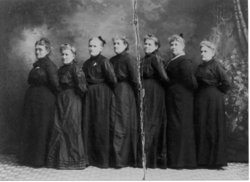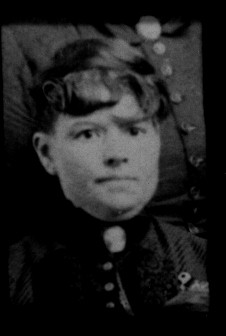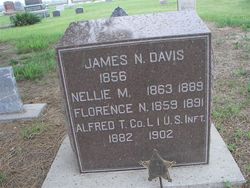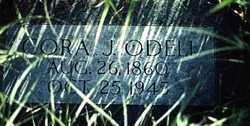| Description |
: |
William Davis
Residence Francisco IN;
Enlisted on 10/9/1861 as a 1st Lieutenant.
On 11/12/1861 he was commissioned into "A" Co. IN 58th Infantry
He was discharged for wounds on 5/23/1864
He was listed as: Wounded 9/19/1863 Chickamauga, GA
Promotions: Capt 6/21/1862
d. 1 November 1885
67 yr 6 mo 5 days
--
From “Past & Present of Saunders Co.”
CAPTAIN WILLIAM DAVIS.
Captain William Davis, who for many years lived within a half mile of the city of Weston, was one of the pioneers of Saunders county and was intimately associated with its early development. Throughout his life he manifested a public-spirited devotion to the...
Read More
|
William Davis
Residence Francisco IN;
Enlisted on 10/9/1861 as a 1st Lieutenant.
On 11/12/1861 he was commissioned into "A" Co. IN 58th Infantry
He was discharged for wounds on 5/23/1864
He was listed as: Wounded 9/19/1863 Chickamauga, GA
Promotions: Capt 6/21/1862
d. 1 November 1885
67 yr 6 mo 5 days
--
From “Past & Present of Saunders Co.”
CAPTAIN WILLIAM DAVIS.
Captain William Davis, who for many years lived within a half mile of the city of Weston, was one of the pioneers of Saunders county and was intimately associated with its early development. Throughout his life he manifested a public-spirited devotion to the general good, a characteristic which led him, to enlist in the Union army for service in the Civil war. He was born in Posey county, Indiana, in 1818, a son of John and Nellie Davis, both of Irish descent.
Captain Davis grew to manhood in his native state and there acquired hid education. At the outbreak of the Civil war he enlisted in Company A, Fifty- eighth Indiana Regiment, for three years, and at the expiration of that time he re-enlisted, remaining at the front for four years in all. His gallantry and power of leadership led to his advancement and in time he became captain of his company. While encouraging his men at the battle of Chickamauga a ball entered his neck and came out at his side and for a time it seemed as if the wound was fatal, but he recovered from its effects to a large extent, although it is probable that it was the real cause of his death in 1885. He was not only severely wounded but was also taken prisoner, being exchanged before the close of the war.
In March, 1873, Captain Davis removed with his wife and eleven children from Indiana to Saunders county, Nebraska, and settled within a half mile of the city of Weston At that time the county was but sparsely settled and the conditions of life were mainly those of the frontier. In connection with William Hill he platted the town of Weston, and he made the first speech in favor of the issuing of railroad bonds, which indicates his clear-sightedness and realization of the great value of railroads to a community. He took a great interest in education and bore the expense of the erection of the first schoolhouse in Weston. He also aided in the agricultural development of the county as he brought his land under cultivation and made a number of improvements thereon. On the 1st of November, 1885, he passed away at the age of sixty-seven years and all recognized that in his demise the community had sustained a distinct loss. He was buried at Weston.
Captain Davis was united in marriage to Miss Nancy Whiting. a native of Indiana, who died June 21, 1892, and was also buried at Weston. They were the parents of eleven children, as follows: Cora is the widow of W. S. Odell, a sketch of whom appears elsewhere in this work. Sarah E. became the wife of Thomas Alexander and died October I3, 1911. Anna V. is the widow of Jacob Muck, of Weston Joseph is a resident of Wahoo. Susan is the widow of the Rev. A. M. Brvant, a Presbyterian minister, who died in June, 1896. He was also a teacher and taught for some time in this county. Mary V. is the widow of William Hill, who, together with Captain Davis, platted the town of Weston.
John is a retired farmer living in Portland, Oregon. Charlotte, now the wife of Henry C. Stephens, is also a resident of that city. Charles is a machinist and resides in Portland. James, who was a farmer, died July 27, 1915. Pearl is the wife of Charles Folsom, a banker of Ashland, Nebraska. At one time after the children had married and left the parental roof they all resided within a radius of nine miles in this county. Captain Davis arid his father were both teachers and twenty-one grandchildren have followed in their professional footsteps.
The Captain was a republican and took a very active part in local politics, being recognized as a leader in his party. Be was justly proud of his splendid record in the army and retained a soldierly bearing throughout his life. Almost his last words were: "Let me rest and get ready for the battle, for I see my men” - words characteristic of his devotion to duty arid his courage. Although he has passed to his reward the work which he did in the early days of the history of this county still endures, and his name is honored as that of a worthy pioneer.
A BRIEF BIOGRAPHY
Of Wm. DAVIS.
William Davis was born in Posey county, Indiana, February 27th, 1818, and died November 1st, 1885. His early youth is veiled by obscurity. Married Nancy Whiting, April 5th, 1840, and eleven children blessed the happy union. He removed to Gibson County, in the same state, where he lived till the commencement of the southern rebellion in 1861.
He had long been a member of the old Whig party, adhering more strongly to the faction represented by Henry Clay.
When the war became inevitable he readily affiliated with the Republicans, and remained true to the party which saved the nation, till he crossed the last river. When the conflict came he was active in enlisting men for the service; he entered Co. 'A’ of the 58th Regiment Indiana Volunteer Infantry, and was commissioned 1st Lieutenant of the same on its organization and muster in October, 1862. The regiment was ordered to the front, Capt. Davis participating in many battles; two of them, Stone River and Chickamauga, were among the fiercest battles of the struggle. While leading his company on the skirmish line in the latter battle, he was severely wounded, the bullet striking him on the left and back side of the neck, passing through the cavity of the chest, was cut out on his right breast just under the skin. He was captured by the rebels, held ten days and then released on parole.
After partially recovering from his wound, he was placed in command of Camp Chase at Columbus, Ohio, where he remained until July, 1864, when he was mustered out at Cincinnati, Ohio. He returned to his home in Gibson County, where he remained until 1873, when he removed to Weston, Nebraska. His patriotism was of high order, for he constantly refused a pension, though he was justly entitled to such aid. He possessed the courage of a brave soldier in action, the rare courage of a civilian in his utterances.
Let us now commence a more specific description of him: He was rather a gaunt, slender man, above the average in height, being about five feet and ten inches, weight, 160 lbs,, the flesh supported by large bones; his eyes were a brilliant dark blue; the color of his hair very dark brown; he had an expressive mouth; ears large enough to exclude him from the stingy class; nose prominent, clearly indicating a superior intellect.
I will now pass to the work of the mind for that is of transcendent importance. His early married life was spent in farming through the summer and teaching in the winter. While attending a teacher's institute a discussion arose as to the best means of acquiring knowledge, he said, "In order to obtain knowledge you have to dig, dig, dig!" A learned professor took exceptions to this however, stating that a pupil should certainly be shown when, where and how to dig; yet there is so much wisdom in the remark that I repeat it here.
His mind was well adapted for doing business, though he never engaged in it for himself.
The possession of that sterling quality of being honest would have greatly aided him had he ventured into this field. Like John Randolph, "He reverenced an honest man in the humblest garb, and scorned the dishonest, though plated with gold.'' His clear insight, quick apprehension, solid judgment, knowledge of men and of events gave him the power to be a prince among politicians. He did not court personal popularity sufficiently to become successful (that is elected to any prominent office), but gained the reputation of a skillful adviser. He was, however, selected for Justice of the Peace, being well versed in common law - besides, I believe, he sat as juryman in several important cases.
A keen observer, an omnivorous reader, possessed of a wonderful memory be easily became the champion in conversation. The variety or knowledge with which he had stored his mind was seemingly inexhaustible. Ingersoll's description of Lincoln would show one part of it for, "He was familiar with actual things, with common facts.” To illustrate how he could distill wisdom from history, he would say, "If you want to know what people are doing now, read the Bible."
Among men, even far above the average in ability, he was unrivaled in the causticity of his statements. He was more caustic than Swift was in satire, because when desirous of using the weapon of sarcasm, he could add a countenance still more expressive than his words. Oftentimes these statements were critical and censorious, but they always possessed the vigorous vitality of the naked truth. He did not have the faculty of delicate criticism. People then would naturally remember what he said and how he said it.
During his latter years men would gather around him when opportunities afforded, as they did the old Greek philosophers, for he was always proud to relate war stories; and this added to his extreme readiness in radiating light by apt illustrations and quotations, drawn from both sacred and profane literature, made him an interesting conversationalist. He spoke after he thought instead of thought after he spoke; was a good listener, but preferred to talk. This latter, together with some of his sayings not noted might indicate he had considerable conceit; if this be true; it came from a depth of knowledge and was far different from the conceit of the ignorant. Relatives and friends have frequently called our attention to expressions of his (some of them I have mentioned) which justifies me in stating he was a man of great understanding. I will quote one to show his individuality in conversation. The statement is striking for its candid praise, its commonplace language, and illustrates the marvelous faculty he had of condensing a world of meaning into a single sentence, he said: “Billy Hill was always willing to carry the bigger end of the log.''
He was original; did not imitate and could not be imitated. Possessed strong common sense which enabled him to excuse the lack of it in others; but never forgot an injury. He was so firm and unyielding that some would consider him stubborn. Many people came to him for advice because he was a most excellent counselor. He hated vanity as to outward appearances and like O. W. Holmes was always disgusted with the application of "varnish and veneer" in every form, well-knowing wise people observe the inner man - the real ego - that cannot be seen by the earthly eye. I think this great praise, considering he lived in an ago when so many are given to aping the rich.
He had the fortitude of a Stoic; cared nothing for the pleasures of an Epicure; more English than French. There was nothing mercurial about him, for he was the same to-day as he was the day before; won the regard of neighbors by being very accommodating. I hardly know which has the greater reputation, the man who is accommodating or the man not so; but it is often difficult to discover the friends of the latter. His general nature would not make friends as fast as some, for be was not always affable nor engaging; yet when friends were once formed, they considered his friendship more valuable than many others. A large number of his friendships were formed by exercising the same peculiar trait of Ben. Butler, who always took the side of the under dog. He was faithful and devoted as a husband; as a father, a good provider, often reticent, which made him seem distant, strict without severity in government, not outwardly affectionate; he rarely if ever kissed his children, though he took great pride in helping them with their studies. His affection was of a deep and solid kind which I conclude does not rise to the surface as in lighter natures. It is my opinion that he really loved his children better, however, than some of them reverenced him during his old age. The grandchildren should observe this and properly reverence and show gratitude to their parents when alive, for surely it is too late to ease our hearts or comfort their's after death. The erection of a costly tombstone with affectionate inscriptions might fool the passer by, but they cannot satisfy the heart because of its past ingratitude. The floodgates of his usually calm and serene soul burst open several times and many tears flowed down his cheeks. This is a superior evidence of sterling manhood.
He had depth enough in philosophy to know that the Bible was a revelation from God. He never entered the class of skepticism so aptly illustrated by Montaigne, "That, like ears of corn, shoot and raise their heads high and pert while empty; but when full and swelled with grain in maturity, begin to flag and droop." He pondered over its sacred pages and discovered that its teachings were well calculated for the development and needs of the human race. The evidence to him was plain, for it contains milk for babes and food for giants; waters where minnies can swim safely and where whales never touched bottom. It was his arsenal for authority. Professed religion at the age of 20 and united with the M. E. church, remaining within its fellowship while be lived. His religion was of Samarian type, for he was generous to worthy objects and helped the helpless. While the Methodist church is nearer actual conflict with the greatest evil in the world than any other denomination, he did not keep pace with this advanced idea.
Let us now bring these unconnected paragraphs to a close together with an account of the last of his life. Old age had philosophically prepared him to meet death, so while he was walking over his farm one day, be dropped a stone to the ground, stating here is where you may bury me, and shortly after this he was buried. The stone, also marked the corner of a cemetery, which he had deeded, without price to the Trustees of Weston for the occupancy of both sinners and saints. Thus he took more interest in the mortal remains of man than many do while in life.
I admire his many virtues, love his eccentrical nature, and gladly excuse his imperfections.
--
"Obituary - DAVIS - At his home in Weston, Neb., on Sunday evening Nov. 1, 1885, Captain William Davis, aged 67 years, 8 months and 5 days.
On Monday last the news was conveyed to us of the death of Capt. Wm. Davis, at Weston in this county after a lingering illness of several years. It was sudden news to us because we had not been informed of his feeble and failing condition. It will be sad news to many in this county where he had lived so long and was so well known and respected.
Capt. Davis was born in Posey county, Indiana, on the 27th day of February 1818, and had he lived till next February would have been 68 years old. At an early age he removed to Gibson county, that state where he lived till the breaking out of the war in 1861. He had long been a member of the old Whig party and when it broke up he readily affiliated with the republicans, and has always acted with the party since. When the war came he was active in enlisting men and with his son, Jos. N. Davis of this town and Prof. A. M. Bryant formerly of this county – his son-in-law, he entered Co. “A” of the 58th Reg’t Indiana Vol. infantry and was commissioned 1st Lieu’t. of the same on its organization and muster in October 1862. The regiment was at once ordered to the front and was at Mill Springs, Kentucky, when Ft. Donaldson fell. It was assigned to Wood’s division of the 21st army corps , and afterwards a part of the 4th army corps in the “Army of the Cumberland.” Capt. Davis participated in many of the battles and skirmishes of the army. He was in the battle of Stone River under the command of Gen. Rosecrans. He was under Gen. Buel at the battle of Shiloh, though he did not participate in it. But at Chicamauga, where the lamented Gen. Thomas did such heroic duty, his regiment performed splendid service. In this battle, while leading his company on the skirmish line, he was severely wounded, the bullet striking him on the left and back-side of the neck, passing through the cavity of the chest, and was cut out on his right breast just under the skin. In this battle he, together with all the severely wounded was taken prisoner and was in the hands of the rebels for some ten days when he was released on parole. After recovering sufficiently from his wound he was placed in command of Camp Chase at Columbus, Ohio, where he remained until July 1864, when he was mustered out at Cincinnati, Ohio, while on his way to rejoin his regiment, because of wounds received in the service while in the line of duty. Thus ended his career as a soldier.
He returned to his home in Gibson Co., where he remained until 1873, when he removed to Weston, in this county where he has since resided.
In 1838 he professed religion and united with the M. E. church, remaining within its fellowship while he lived. Of his family of a wife and eleven children, he is the first to die. He leaves an aged wife and four sons – Joseph N., James N., John W., Charles W. and seven daughters, Mrs. Sarah Alexander Peek, Mrs. Hill, Mrs. Stevens, Mrs. Mauck, Mrs. Odell, Mrs. Pearl Folsom and Mrs. A. M. Bryant, to mourn his loss.
Thus has passed from earth, a loving, kind-hearted husband, and an affectionate father. May his children and grandchildren imitate and cherish his virtues and forever keep his memory green in their hearts.
In politics he was an ardent republican and loved the party that saved the nation from a democratic rebellion. His funeral was largely attended on Monday last from his late home, Comrade Roberts of John A. Andrew Post, No. 90, officiating. The was also an attendance of the members of the post for it was known that he ardently desired to unite with the order while he lived and was only prevented by ill health. But he has gone to answer as a faithful soldier to the last roll call and to hear from the lips of his Great Captain the welcome words "Well done, good and faithful servant, enter upon and enjoy your reward."
"And so he giveth his beloved sleep."
- The Independent; November 5, 1885
|

